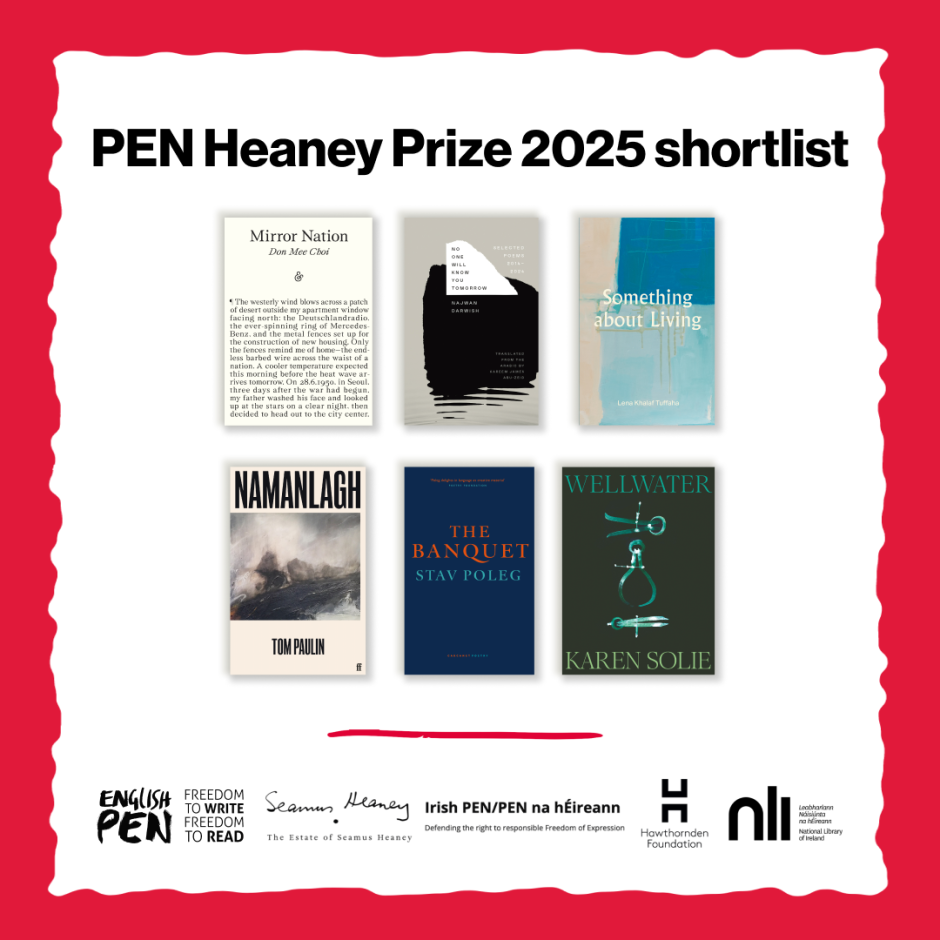
English PEN, together with Irish PEN/PEN na hÉireann and the Estate of Seamus Heaney, announces the shortlist for the PEN Heaney Prize 2025, which recognises a single-author collection of poetry of outstanding literary merit that engages with the impact of cultural or political events on human conditions or relationships. The inaugural winner in 2024 was Susannah Dickey for ISDAL (Picador Poetry).
The winner of this year’s PEN Heaney Prize will be announced on Monday 1 December 2025 in a ceremony at the National Library of Ireland, Dublin. Tickets to the ceremony are available to book here.
The PEN Heaney Prize 2025 shortlist is:
- Mirror Nation by Don Mee Choi (And Other Stories)
- No One Will Know You Tomorrow by Najwan Darwish, translated by Kareem James Abu-Zeid (Yale University Press)
- Something About Living by Lena Khalaf Tuffaha (the87press)
- Namanlagh by Tom Paulin (Faber)
- The Banquet by Stav Poleg (Carcanet Poetry)
- Wellwater by Karen Solie (Picador)
The PEN Heaney Prize 2025 is judged by poets Sasha Dugdale, Seán Hewitt and Zaffar Kunial, with Chris Heaney joining them as non-voting Chair and representing the Estate of Seamus Heaney.
Of the shortlisted titles, the judging panel said:
Mirror Nation by Don Mee Choi
‘Don Mee Choi’s Mirror Nation is the last in her trilogy of works that combine poetry, documentary, photography and philosophy to create art of astonishingly radical and political potential. Choi’s father was a photographer, whose job took him to zones of conflict and unrest. In Mirror Nation Choi counterpoints the history of two divided nations, Germany and Korea, through her father’s photographs. The resulting work comments on the philosophy of history with rare lyric grandeur.’
No One Will Know You Tomorrow by Najwan Darwish, translated by Kareem James Abu-Zeid
‘Najwan Darwish’s poems are trenchant and hard-won. We were struck by the almost prophetic, spiritual reaches of the poems, paired often with a direct and clear use of language in the work of the translator, Kareem James Abu-Zeid. Above all, we were moved by Darwish’s urgent exploration of history and home.’
Something About Living by Lena Khalaf Tuffaha
‘Lena Khalaf Tuffaha’s collection impressed us with its clear-eyed interrogation of language, violence, displacement and survival. These poems are deeply rooted in tangible worlds, and full of the ghosts and injustices that shape them. All the while, it reaches towards a defiant, moving sense of hope and the possibility of light.’
Namanlagh by Tom Paulin
‘Tom Paulin’s Namanlagh is beautiful and moving. One of the poems is called ‘Spare Room’ and spareness is at work throughout – often the poems are a single stanza with relatively short lines. It’s as though nothing is to be falsely embellished and yet the language sings ‘like the real hard stuff’ – even through depression, as history echoes with the present and small resistances speak up.’
The Banquet by Stav Poleg
‘Stav Poleg’s The Banquet is an invitation to a conversation. If we accept, we find ourselves in a propulsive, dynamic and dizzying world: the world of the exile, in which an identity builds and re-builds itself in mesmeric and grief-filled triplets. The Banquet gets to the heart of what it means to be cast adrift in language, time, geography, and to build from the experience new links between words and matter.’
Wellwater by Karen Solie
‘Karen Solie’s Wellwater is a superb collection that navigates personal and political landscapes fluidly, with poems that often read conversationally but hold many memorable and impressive lines. The themes are various and ambitious – including ideas of “value”, home and tenancy, environmental imbalance, and intimate themes such as ageing – but are always movingly and lyrically intertwined.’
Will Forrester, Head of Literature Programmes at English PEN, said:
‘With our partners at Irish PEN/PEN na hÉireann and the Estate of Seamus Heaney, we are delighted that the second PEN Heaney Prize shortlist celebrates six collections which are – in words that recur in the judges’ readings of them – deeply personal, deeply political, and deeply concerned with the power of poetry. This is a shortlist of singular works that find shared interests in language, land, love and loss – and in the social and political conditions that both animate those existential matters and are in turn animated by them. We hope readers newly finding these collections will be rearranged by them just as they have rearranged us.’
The PEN Heaney Prize is supported by Hawthornden Foundation and the Estate of Seamus Heaney.